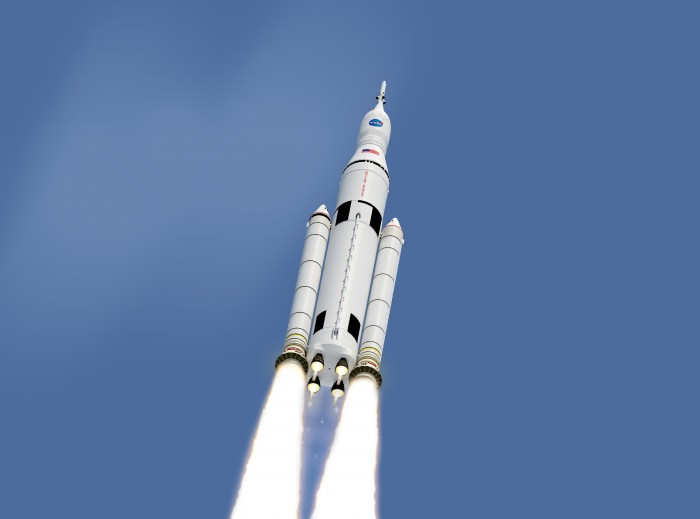The 21st-Century Space Race: Will Boeing or SpaceX Be First to Mars?
The spacesuit gloves are off. It’s not just Elon Musk that wants to take us all to Mars—Boeing has declared its ambition, too. The race to the Red Planet is on.
Speaking at a technology conference in Chicago called What’s Next, Boeing’s CEO Dennis Muilenburg signalled his intention to join this century’s space race. “I'm convinced that the first person to step foot on Mars will arrive there riding on a Boeing rocket," he explained.
Boeing's plans to take people to the Red Planet are nothing new. As Ars Technica points out, the company is already working on a craft that will take humans to Mars, because it’s the primary contractors on NASA's new Space Launch System rocket. That rocket will, eventually, be powerful enough to take up to six astronauts to the planet, but such a mission isn’t expected to take place until the late 2030s.

Muilenburg did, however, hint that Boeing is also interested in space tourism, suggesting that near-Earth recreational trips into orbit would be “blossoming over the next couple of decades into a viable commercial market.” Ambitions to take mere mortals to Mars, then, may also be on the cards.
SpaceX’s Martian offering is as ambitious as you would expect for a company run by Elon Musk. At the International Astronautical Congress in Guadalajara, Mexico, last week, Musk explained that he plans for SpaceX to build as many as 1,000 giant interplanetary spaceships—each larger than NASA’s old Saturn V—to ferry people to Mars. Funding plans remain vague at best, though.
Others have had their eyes on taking humankind to Mars before, but their ambitions seem less likely to be realized. The Netherlands-based nonprofit Mars One, for instance, aims to carry out a one-way manned trip to Mars as soon as 2026. But its plans and schedule have received serious criticism from engineers. The Inspiration Mars Foundation, meanwhile, claimed it would launch a manned mission by 2018 or, failing that, 2021. Its website is no longer live, though, which suggests that plans are on hold.
So for now it least, it’s SpaceX and Boeing that will be competing to get there first.
There are still some nagging concerns over plans to take humankind to Mars, though. As difficult as getting there would be, keeping people alive once there is going to be even harder. Elon Musk has made it quite clear that that’s not his problem. He compares the venture to the Union Pacific Railroad: SpaceX is building the transportation network, not the actual colony. Mars-goers will have to fend for themselves.
Given that fact, the other major concern seems all the more pressing: do many people really want to go?
(Read more: Ars Technica, Bloomberg, “Mr. Musk Goes to Mars,” “The Deferred Dreams of Mars,” “Elon Musk May Go to Mars, but Would You?”)
Keep Reading
Most Popular
Large language models can do jaw-dropping things. But nobody knows exactly why.
And that's a problem. Figuring it out is one of the biggest scientific puzzles of our time and a crucial step towards controlling more powerful future models.
How scientists traced a mysterious covid case back to six toilets
When wastewater surveillance turns into a hunt for a single infected individual, the ethics get tricky.
The problem with plug-in hybrids? Their drivers.
Plug-in hybrids are often sold as a transition to EVs, but new data from Europe shows we’re still underestimating the emissions they produce.
Google DeepMind’s new generative model makes Super Mario–like games from scratch
Genie learns how to control games by watching hours and hours of video. It could help train next-gen robots too.
Stay connected
Get the latest updates from
MIT Technology Review
Discover special offers, top stories, upcoming events, and more.